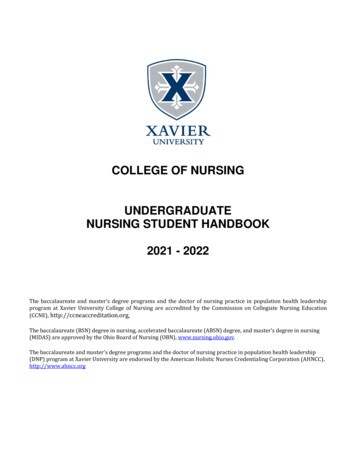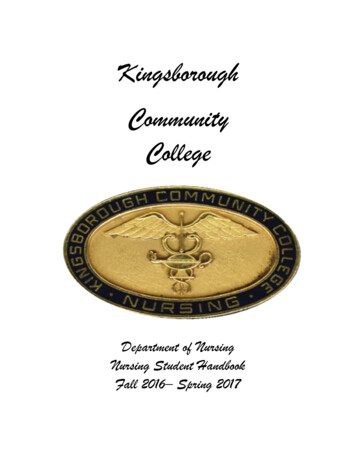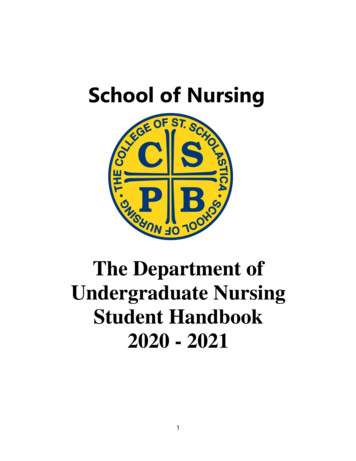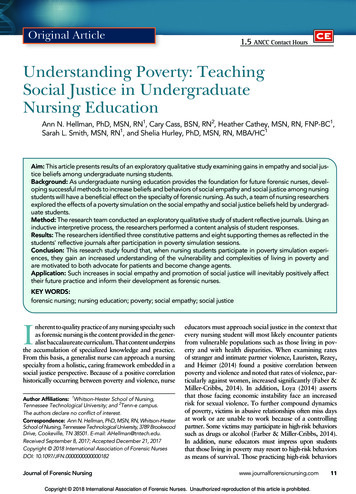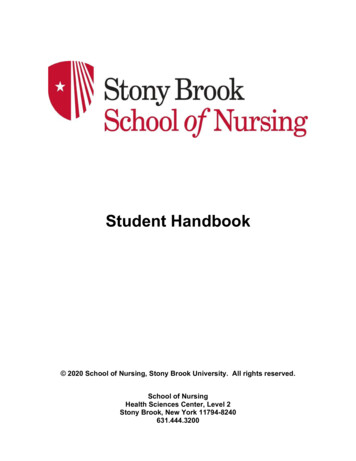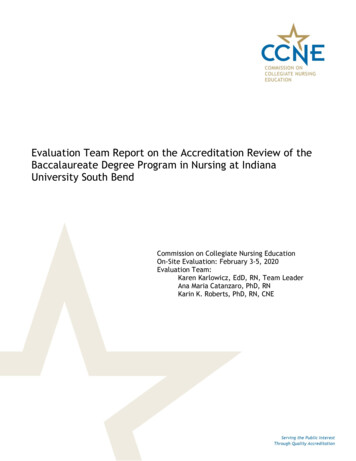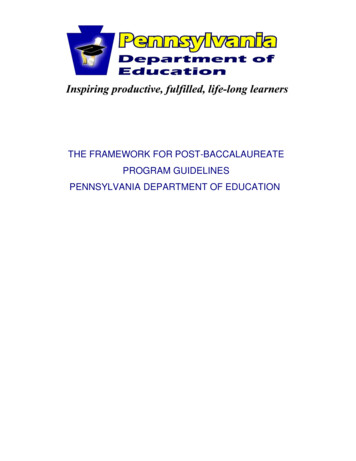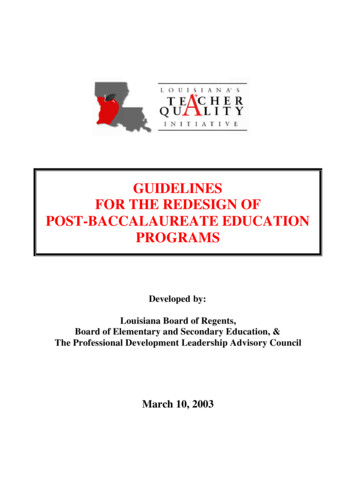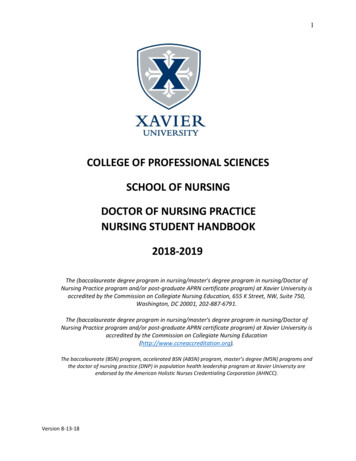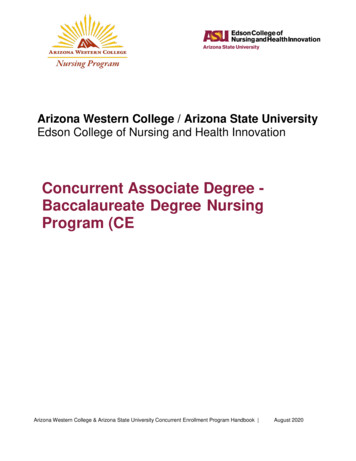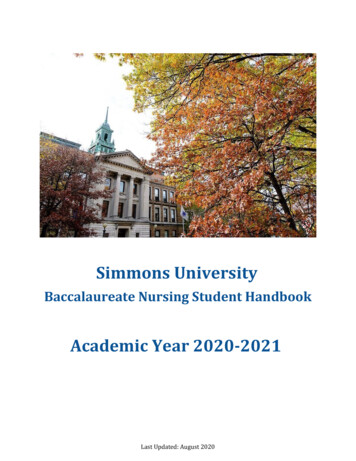
Transcription
Simmons University Baccalaureate Nursing Student Handbook Academic Year 2020-2021 Last Updated: August 2020
Table of ContentsAbout This aureate Program Tracks6Professional Standards that Guide the Baccalaureate Program IncludeStudent Learning Outcome Objectives for Simmons Baccalaureate Nursing ProgramImportant Notices777Non-Discrimination and Title IX Policies7Bias Response Protocol8Religious Observances8Academic & Educational Records8Contact Information8Student Work9Definition9Ownership and Use10Copyright10Honor Code & Academic Integrity10Honor System10Student Principles11Honor Code of Responsibility11Academic Integrity11Student Legal Name and Name Changes11Equal Access Policy12The Simmons Commitment to Diversity, Equity and Inclusion12Our Diversity & Inclusion Mission12Notice of Non-Discrimination13Reporting Sexual Misconduct13Students Reporting Discrimination or Retaliation13Advice on Whom to Contact about a Concern or Incident14Grievance Procedure14Information for Students with Disabilities14Campus Security14Human Subjects15Policies15General Nursing Policies15Code of Conduct and Discipline151
Professional Behaviors15Professional Communication16Summary of Expected Behaviors17Social Media Use17Technical Standards18Professionalism and Integrity Issues18Accessibility and Special Health Needs18Students with Accessibility edical Leave19Board of Registration Policy on Good Moral Character and Licensure Requirements19Student Complaints19Chair of Undergraduate Nursing19College of Natural, Behavioral, and Health Sciences19Clinical Education Policies19Registration for Clinical Nursing Courses19Clinical Placements20Clinical Attendance Policy20Definitions20Rationale20Expectation for Attendance and Punctuality20Clinical, Laboratory or Simulation Absence21Unavoidable Absences21Notification21Failure to Notify of Lateness and Absence21Consequences of Clinical Absence21Repeated Tardiness22Clinical Absence Make-Up22Special Circumstances22Clinical Safety and Performance22Reportable Event Policy22Student Health Insurance23Injury On Site/Exposure to Infectious Disease23Professional Liability Insurance23Dress Code23Transportation24Use of Handheld Devices in Clinical24Clinical Requirements24Demonstration of Medication Calculation and Administration Safety CompetencyHealth Clearance2425Cardiopulmonary Resuscitation Certification (CPR)25Criminal Offender Record Inquiry (CORI) Policy25Nursing Lab Policies262
Academic Policies28Student Advisement28Retaking of Science Courses28Grading Values28Clinical Courses28Grading Policies28Classroom Policies29Exam Policies29Missed Exam Policy for Undergraduate and Pre-Licensure Direct Entry Students30Grade Appeal Process30Exam Review Policy30Progression and Retention Policy30Interruption in Progress30Course Withdrawal31Academic warnings31Departmental Probation31Nursing Course Failure and Program Dismissal31Return Following a Leave of Absence (LOA)32Academic Review Board (ARB)32Health Sciences Appeals Committee32Process33Study Abroad33Admissions Policies for Nursing Academic Tracks33Applying to the 4 1 BS-MS Nursing Program33Addendum 1: Congruence between Values & Learner Outcomes of the University and the SoN34Addendum 2: Vaccinations/Immunizations Required for Clinical35Tuberculosis and the PPD (Purified Protein Derivative) Test35Tetanus, Diphtheria, and Pertussis (Tdap)35Measles35Mumps35Rubella35Hepatitis B35Varicella36Seasonal Flu Vaccine36Addendum 3: Technical Standards of Professional Nursing Practice for Simmons University Pre-LicensureNursing Students36Technical Standards Definition37Technical Standards Summary37Reasonable Accommodations for Qualified Individuals with Accessibility Needs37The First Core Competency: Cognitive Abilities38The Second Core Competency: Communication Skills38The Third Core Competency: Observational Abilities383
The Fourth Core Competency: Physical, Motor, and Perceptual Requirements38The Fifth Core Competency: Behavioral, Interpersonal, and Ethical Comportment Skills39Additional Considerations39Addendum 4: Preceptor Voucher Policies39Professional Development Vouchers (Campus-Based Programs)Procedure for redeeming voucher(s)3940Clinical Preceptor Scholarship Program (Nursing@Simmons)440
About This HandbookThe Simmons University Baccalaureate Nursing Student Handbook contains University policies, guidelines, andprocedures relating to Simmons Nursing Programs and is meant to supplement the Simmons University StudentCode of Conduct described below. Students are responsible for knowing the information contained in theHandbook and are bound to the policies, guidelines, and procedures as soon as they become a nursing student.The policies, guidelines, procedures, and other information contained in the Handbook are not intended to, nor dothey create any contractual rights for students. The Simmons School of Nursing (SoN) reserves the right to changeany of the policies, guidelines, procedures, and other information contained in the Handbook at any time. If youhave questions regarding any of these policies, guidelines, procedures, or other information, please contact theAssociate Dean of Health Sciences.The Simmons University Code of Conduct provides important information on university-wide policies including: Student Rights and Responsibilities Honor System Valuing Diversity Non-Discrimination Bias Response Protocol Gender-Based Misconduct Conduct System Hazing Policy Alcohol & Illegal Drugs Technology Policies Protest and Demonstration Student Records Missing Student PolicyAcademic Policies General Policies Undergraduate PoliciesStudent Resources5
OverviewVisionThe Simmons School of Nursing is a welcoming and diverse community that is preeminently known for preparinginnovative clinicians and knowledgeable scholars who lead the re-design of health care to address the changingneeds of humankind worldwide. The education of future nursing professionals is designed to improve the healthand common good of the world embracing the following values: Respect: We have the utmost regard for one’s individual humanness and inherent dignity.Social Justice and Inclusion: We appreciate the differences of all people, cultures, identities, andperspectives.Integrity and Accountability: We accept responsibility for establishing and maintaining the trust of patientsand families during the provision of safe, quality care.Collaboration and Teamwork: We provide holistic care with a unique disciplinary focus as part of aninterprofessional team.Caring and Compassion: We offer care and compassion to those in need with intention and purpose.Professional Development We are committed to life-long learning and the advancement of nursing science.Excellence: We provide specialized expertise and wisdom to optimize health outcomes for patients,families, and communities.MissionThe School of Nursing is preeminently known for its transformative, learner-centered education preparingstudents to become compassionate, patient and family-centered clinicians who care for diverse populations.Our program of study is designed to prepare nurses in various spheres of health care to be future leaders who areclinically expert, socially and scientifically grounded, inquisitive and curious. Our graduates engage in nursingpractice that is exemplified by caring, scholarship, leadership, and advocacy commensurate with their level ofpreparation in order to advance nursing science and address the significant health concerns within our globalsociety.PhilosophyThe Nursing Program offers a liberal arts and professional education which is fundamental to an appreciation ofindividuals as citizens in a global society and the development of communication, critical thinking, and clinicaljudgment skills to address the health care needs of a diverse world.Professional nursing is focused on the unique relationship with patients and families and the diagnosis andtreatment of their human responses to actual or potential health problems within and across various care settings.As a member of the interprofessional health care team, the nurse is committed to promoting, restoring, andmaintaining health, or supporting a peaceful death using knowledge from the natural sciences, behavioral sciences,and aesthetics.Professional nurses are ethically and legally accountable for their actions within and across various care settings.The nurse independently utilizes the nursing process as a basis for the practice of professional nursing inaccordance with the Standards of Nursing Practice and the ANA Code of Ethics. As an advocate, the nurse appliesprinciples of caring and empathy to guide moral choices on behalf of the patients and families being cared for andserves an active participant in the social and political processes that influence the health care delivery system.Baccalaureate Program TracksThe School of Nursing offers a number of programs for different types of students. Specifically, we offer: Traditional 4-year BS in Nursing 8-Semester nursing course sequence 10-semester nursing course sequence The Dorothea Lynde Dix Scholars Program, designed for students who are 24 years or older, provides6
adults with the opportunity to benefit from the unique combination of liberal arts and sciences, as well asprofessional study that Simmons undergraduate programs offer. Our Nursing Dix Scholars Programs: 16-month program for individuals with a previous BA/BS who wish to accelerate 2-year option for those without a baccalaureate degree or those desiring a part-time program In our innovative 4 1 year BS/MS in nursing program, students complete an accelerated BS in Nursingcurriculum prepared for the registered nurse licensure (NCLEX) exam. Upon passing, students move intothe graduate portion of the program, which consists of three components – foundational courses, primarycare, and research. We prepare students to deliver primary health care to diverse populations across thelifespan. RN-BSN programProfessional Standards that Guide the Baccalaureate Program Include The American Nurses Association Standards of Clinical PracticeThe American Nurses Association Nursing Code EthicsThe American Nurses Association Social Policy StatementThe American Association of Colleges of Nursing Essentials of Baccalaureate Education for ProfessionalNursing PracticeThe Nurse of the Future Core CompetenciesInstitute of Medicine’s Core Competencies for all Healthcare ProfessionalsQuality and Safety Education for NursesStudent Learning Outcome Objectives for Simmons Baccalaureate Nursing ProgramUtilize current evidence, clinical judgment, and patient preference to systematically assess, analyze, implement,and evaluate healthcare interventions, in order to promote safe, quality care throughout the lifespan, beginningwith health promotion, through end of life.Deliver compassionate and respectful, patient and family centered care, and education that reflects anunderstanding of human growth, development, nutrition, genomics, spirituality, culture, symptom management,and health literacy across the health illness continuum, through all transitions of care, in all healthcare settings.Communicate/collaborate effectively with all members of the healthcare team, patient and family.Demonstrate leadership competency, both interprofessionally, and when delegating and supervising, orcoordinating teams to achieve shared goals and improve patient outcomes.Synthesize knowledge of healthcare delivery systems, social justice, global health, healthcare policy, informatics,and principles of entrepreneurship, in addressing the healthcare needs of individuals and populations.Accept accountability for continued development as a strategic, ethical, and reflective scholar and practitioner, toengage as a lifelong learner, with the goal of advancing the profession of nursing.Please see Addendum 1: Congruence between Values and Learner Outcomes of the University and the School ofNursing (SoN) on Page 37.Important NoticesThe principles and policies outlined in this section apply to admissions, progression, attendance, courseexemption, advanced placement, transfer, education mobility, withdrawal, re-admission, graduation, student rightsand grievances.Non-Discrimination and Title IX PoliciesSimmons University does not discriminate on the basis of race, color, religion, national origin or ancestry, sex,sexual orientation, gender identity or expression, physical or mental disability, marital status, veteran’s status, orage, in its programs and activities.7
Please read the information contained in the below links to learn more about Simmons UniversityNon-Discrimination and Title IX policies:Admissions Notice of Non-DiscriminationNotice of Non-Discrimination Grievance ProceduresTitle IX and Freedom from Discrimination and HarassmentGender-based Misconduct PolicyBias Response ProtocolSimmons is committed to inclusive excellence in all aspects of an individual’s community experience. Our values,vision and mission mandate that we strive to create an environment that is free of bias, prejudice, discriminationand hurtful acts. Individuals who believe they have experienced or encountered bias, harassment or discriminationcan utilize the Simmons bias response protocol to have their concern addressed. Information about protocol can beaccessed via the link below.Bias Responses ProtocolReligious ObservancesClasses may be scheduled and held on days that fall on one or more religious holidays. Please consult the academiccalendar to see the dates when classes are held in a given year. Faculty members or students who areunable—because of their religious beliefs—to give a class, to attend classes, or to participate in an examination,class, or work requirement on a particular day so that they can observe a religious holiday shall be excused andprovided with an opportunity to make up the examination, study, or work they may have missed consistent withMassachusetts General Law. Religious accommodation is a legal right for students and faculty; it is not a matter leftto the discretion of any faculty member or administrator. Absences due to religious observances are not limited tocertain religions or particular holidays; the law covers all religions and all religious holidays.Academic & Educational RecordsContact InformationAll students are responsible for information sent to them using their simmons.edu address. You may forward theSimmons email to another email account.The Family of Educational Rights and Privacy Act (FERPA)The University’s practice in regard to student record-keeping is based on the provisions of the Family EducationalRights and Privacy Act of 1974 and is intended to be a safeguard against the unauthorized release of information.This act applies to all enrolled students, former students, and alumni. It does not apply to applicants seekingadmission into an institution.Under the provisions of the act, it is the right of the student to view their official educational records. Educationalrecords are defined as records regarding a student that are maintained by an educational institution. Such recordsare kept in the Office of the Dean for Student Life, the Office of the Registrar, faculty advisors' offices, and theAcademic Support Center. Not included in this category of records are the following: Records containing confidential information written before January 1, 1975 Financial records submitted to the University by the parents of a student Medical and counseling records Records containing information on more than one student Private records intended for use of an individual Law enforcement records Student employment records Records to which a student has waived their right of access as required by a judicial order or a lawfulsubpoenaA student may view their record in AARC at any time. A student must make a request in writing to order an official8
transcript so please email the Office of the Registrar at registrar@simmons.edu to do so. The office has 45 days tofulfill the request. If requested, copies of a student's record are available to the student for a slight charge to coverthe cost of duplicating. Any information in a student's record found to be "inaccurate, misleading, or [that] violatesthe privacy or other rights of the student" (FERPA) may be challenged by the student. Only the accuracy of theinformation may be challenged. For example, a grade received may not be questioned, only the accuracy of itsrecording. In order to contest the information in their record, the student must submit a written statement to theperson responsible for the content of the record and request that they receive a written response. If no writtenresponse is forthcoming or if an unsatisfactory response is received by a student, they may appeal to thechairperson or appropriate supervisory person. In the event that no resolution is made, it is the student's right torequest a hearing, to be presided over by the Dean of Student Life or a University designee.The University has the right to publish a directory listing all enrolled students and containing the followinginformation: student's name address telephone number place and date of birth concentration digital photo year of graduation and dates of attendance awards and degrees received membership in organizations educational institution most recently attendedA student who wishes to be omitted from the directory must indicate this via email to the Office of the Registrar atregistrar@simmons.edu by the last day of the term prior to the start of the following term. For example, in order tobe omitted from the directory for Term 2, the Office of the Registrar must be notified by the last day of Term 1.A student's record is not accessible to anyone outside the University without the written authorization from thestudent. Exceptions to this regulation are as follows: officials at an institution where the student is applying for admission officials disbursing financial aid parents of a dependent student (for tax purposes) accrediting and educational testing organizations federal officials officials complying with a judicial order appropriate officials in the event of an emergency (only if necessary to safeguard the health or well-being ofthe student or other individuals) the alleged victim of a crime of violence may receive results of any disciplinary proceedings conducted bythe University against the alleged perpetrator of that crime in reference to that crime. Student records areavailable to the above with the stipulation that this information is only for the use of the above unlesswritten consent is secured from the student.Student records may not be distributed to other parties. It is the responsibility of each office maintaining records tokeep a log that verifies the name and date of each person who has viewed the record and for what reason. Studentshave the right to see this log.A student may sign a waiver of access to confidential recommendations, but the student must be kept informed ofthose people providing recommendations.Student WorkDefinitionPapers, computer programs, dissertations, theses, artistic works, musical works, and other creative works made by9
Simmons students in the pursuit of their academic coursework while enrolled as a student.Ownership and UseStudents shall own copyright in student work except in the following cases:1. Copyright to Traditional Works authored by faculty with assistance from students shall be owned byfaculty or the University.2. The University shall own a student work that is a sponsored or externally contracted work.3. Students Works created in the course of the student’s employment by the University shall be consideredWorks Made for Hire, and the University shall retain ownership and use of such works.***Works created by students for third parties as part of an internship or experiential learning program are notsubject to this policy.To ensure that Simmons University continues to respect the learner's rights, Simmons University may not and willnot accept information from learners under an obligation of confidentiality. Types of information that could besubject to confidentiality requirements include information obtained from an employer, unpatented inventions andinformation obtained pursuant to a nondisclosure agreement. Information that is subject to an obligation ofconfidentiality may not be used in any part of the Simmons University learning process, including but not limited toweb postings, materials prepared for a course, dissertation work and/or comprehensive examinations.To the degree that applicable laws or regulations provide for confidentiality, such as in connection with certainlearner records and financial aid, Simmons University will abide by such laws or regulations.Faculty members do not have authority to modify this policy. Simmons University therefore recommends thatprior to disclosing any information to faculty members, learners ensure that the information being disclosed is notconfidential information of a third party.CopyrightAs a community of scholars, Simmons University subscribes to the belief that intellectual property rights should berespected and honored and also that fair and appropriate use of published materials is both a legal and an ethicalobligation that all members of the Simmons community should observe.It is the policy of the University that all members abide by the relevant copyright laws. These laws include: The Copyright Law of the United States of America Title 17, U.S. Code, Sect. 101, et. seq. General Revisions of the Copyright Law Public Law 94-553 (effective January 1, 1978) 1998 Digital Millennium Copyright Act Public Law 105-304 1998 Sonny Bono Term Extension Act Public Law 105-298The intent of the Simmons University Copyright Policy is to encourage scholarship conducted in the spirit of honestinquiry. Using the works of others obligates scholars to acknowledge such use whose works are protected by thelaw. It is the individual user's responsibility to comply with copyright law. You should permanently keep a copy inyour files of any permission-to-use that you obtain.Honor Code & Academic IntegrityHonor SystemA vital part of the collegiate experience at Simmons University, the Honor System, embodies values of personalintegrity, honesty, and trust. Fundamental to the Honor System is the Honor Code of Responsibility, and it is uponits principles that the University community has based the Simmons Standards of Conduct. The Simmons10
University Honor System has existed since 1907, making it one of the oldest continuing honor systems at anyUniversity in the country. Throughout the decades, the Honor System has been revised and amended on an annualbasis. Changes are made after consultations with faculty, staff, and students.Student PrinciplesIndividual responsibility is the foundation of the Simmons community. The student’s enrollment at SimmonsUniversity carries with it the expectation that one will abide by the Honor Code of Responsibility.Enrollment in a course implies an agreement between instructor and student. The instructor is obliged to teach, toevaluate student work, and to be available for conferences during designated office hours; the student is obliged tocomplete all work by the assigned deadlines, to attend all classes, and to devote sufficient out-of-class time tocourse material. Three hours spent out of class in preparation for every hour in class is a reasonable expectation.Attendance and punctuality are expected at all classes. While there are no established University-wide penalties forabsences, the instructor may take attendance into account when evaluating the student’s performance in thecourse. In accordance with Massachusetts state law, no student will be penalized for absence due to religiousobservances.Honor Code of ResponsibilityThe students, faculty, and administrators of Simmons University agree to accept the following responsibilities: Each member of the Simmons University community is responsible for maintaining a high level of civility,integrity, honesty, and trust within the community. Each student is responsible for presenting work of their own creation, and refraining from representing astheir own work which is not theirs. Conduct in keeping with the policies outlined in this handbook and all other official University publicationsis expected of each member of the Simmons community.The Honor Code of Responsibility is shared by the entire Simmons community. It implies that each segment hasobligations based upon its specific function within the University.Academic IntegrityEach student is expected to read, understand, and observe the policies outlined in this handbook as well as allother policies that govern students enrolled at Simmons University including those found in the Simmons StudentHandbook, and the Simmons University Student Code of Conduct. Simmons University reserves the right to require the withdrawal of any student who does not maintain acceptableacademic standing or modes of behavior as outlined in the Undergraduate Catalog, Graduate Catalog, StudentHandbooks, and other official publications.Student Legal Name and Name ChangesA student's name of record is defined as the legal name under which the student was admitted to SimmonsUniversity. Legal name is that name, verified by a birth certificate, marriage certificate, social security card,passport, or court order.Your legal name appears on all Simmons records, including transcripts, verifications, and diplomas. CurrentSimmons students who have legally changed their names since the time of admission may request that this changebe made on their official records.Students who wish to change their name from the name of record at the time of admission must provide the Officeof the Registrar with legal documentation reflecting their new legal name, such as a marriage license orgovernment-issued ID, as well as a Name Change Form. Forms may be faxed along with a scanned copy of legaldocumentation to the Registrar's Office at 617-521-3144 or brought to the Office with legal documentation in11
person, Room C-115 in the Main College Building.Consult the Registrar’s page on the University website for additional information about updating your first namefor class rosters or your diploma and for indicating preferred pronouns.Equal Access PolicyAll students are given equal access to the University’s programs and resources. As permitted by state and federallaw, admission to the University’s undergraduate baccalaureate program is reserved for individuals who identifyas women. Simmons is committed to admitting qualified students of any race, color, age, religion, sexualorientation, gender identity, and national and ethnic origin, regardless of disability, to all the programs andactivities generally made available to students, including scholarship and loan programs, athletic programs, andother University- administered social, educational, and recreational programs, and student services. All graduateschools and programs are open to both men and women.The Simmons Commitment to Diversity, Equity and InclusionThe Simmons Commitment to Diversity, Equity and Inclusion was developed with input from the Diversity, Equityand Inclusion Action Council, supported by the College leadership, and unanimously affirmed by our Board ofTrustees.Simmons is committed to inclusive excellence in all aspects of an individual’s community experience. Our values,vision and mission mandate that we strive to create an environment that is free from bias, prejudice,discrimination and hurtful/hateful acts that can prevent each member from thriving in the Simmons community.Our Diversity & Inclusion MissionWe seek to extend to the entire Simmons University community opportunities for learning, growth, success, andmeaningful participation and to build a welcoming, diverse, and inclusive culture for our community. To that end,we will engage in ongoing work to combat racism, bias, and all forms of individual and institutional oppression.We believe diversity is necessary in all aspects of an educational and residential environment to ensure inclusiveexcellence. As an academic community, rich with varied life experiences, perspectives, and values, we are uniquelypositioned to facilitate the ongoing engagement and intellectual dialogue that honors the inherent and uniquecharacteristics of each member of our community. This includes, but is not limited to, interrogating sociallyconstructed concepts and addressing issues of power, phobia, isms, or any other detractors to building andsustaining an equitable community.Simmons will affirm diversity and inclusion by moving beyond tolerance and civility to a respect and appreciationthat recognizes the social positioning of underrepresented and marginalized segments of the population.Simmons values academic excellence, intellectual freedom, critical thinking, leadership, innovation, respect for thedignity of all individuals, and continuous improvement. We adhere to policies and practices that promote andsupport diversity and inclusion.We prepare students to be well informed, open-minded, and sensitive to the values and diversity of others. Westrive to foster an atmosphere where students can become actively engaged leaders in a changing, diverse society.We promote this goal through proactive and continual exchange of ideas among students, faculty and the generalcollege community.To ensure that these goals are attained, Simmons University commits to the following principles. We recognize, respect and honor the inherent individuality of all. We strive to ensure that all decisionsconcerning the educational progress of students are based on considerations appropriate to an academic
The American Association of Colleges of Nursing Essentials of Baccalaureate Education for Professional Nursing Practice The Nurse of the Future Core Competencies Institute of Medicine's Core Competencies for all Healthcare Professionals Quality and Safety Education for Nurses Student Learning Outcome Objectives for Simmons Baccalaureate .
